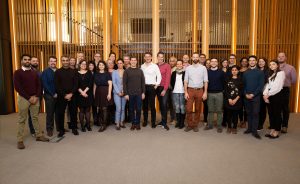Stem cell biologist and neurosurgeon Mark Kotter founded Bit Bio in hopes of decoding what they call “cellular identity,” to one day be able to recreate each of the body’s cells. Bit Bio does this through Opti-OX, a platform that can reprogram human cells consistently and efficiently, for use in cell therapy, drug discovery, or other research opportunities.
Opti-OX allows stem cells to be reprogrammed as highly specialized cells like those found in the liver, immune system, or heart. The company claims that the speed, scale, and consistency with which it is able to produce human specialized cells is entirely unmatched in the field. Kotter thinks his pie-in-the-sky goal of producing every cell in the human body actually isn’t that far off.
“This will unlock a new generation of cell and tissue therapies for tackling cancer, neurodegenerative disorders and autoimmune diseases and accelerate the development of effective drugs for a range of conditions. The support of leading deep tech and biotech investors will catalyze this unique convergence of biology and engineering,” he said in a statement.
Kotter isn’t the only one who believes in his mission -- the startup has only been around since 2016, and recently raised $41.5 million in Series A funding over the course of 3 weeks. Former director of the National Cancer Institute Richard Klausner jumped at the investment opportunity and led the round. Other Series A investors include Blueyard Capital, Foresite Capital, and Arch Venture Partners.
It’s been 17 years since the human genome was completely mapped, and 8 years since CRISPER technology has been used to edit genetic material. In that time, myriad treatments have been developed based on patients’ unique genetic makeup. A more intimate knowledge of the human genome has also led to the development of pharmaceuticals that can target the exact mechanism by which a pathogen spreads throughout an organism.
Cell therapy successes have provided a window of hope for cancer patients. However, there is a finite amount of human cells available for research, and they come with a hefty price tag. Bit Bio hopes their solutions can eliminate these obstacles, while also reducing the need for lengthy and expensive animal studies.























